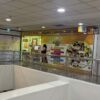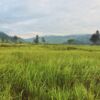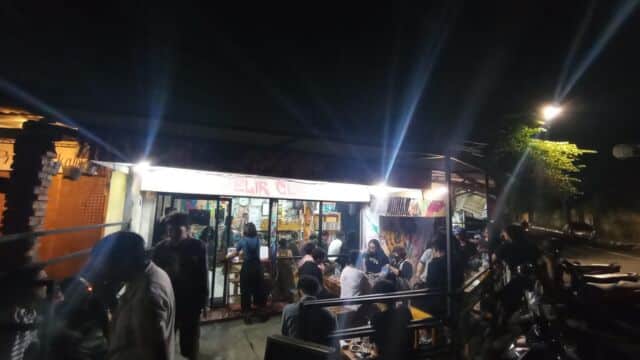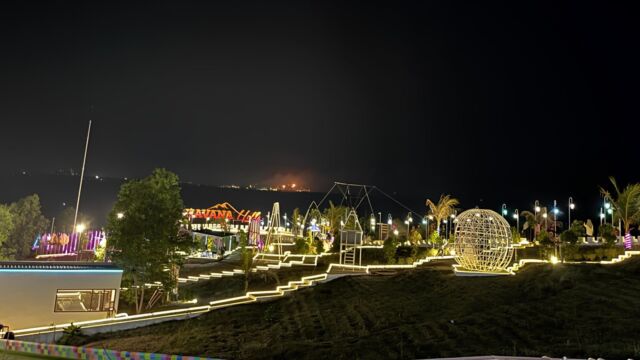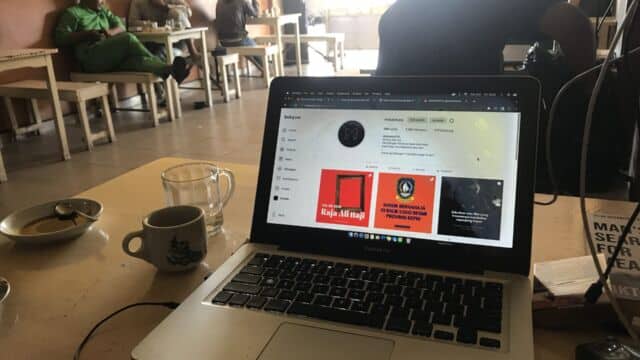The Best Hangout Spot in Serang
Photo: Visual Karsa/Unsplash
A sidewalk bench | 2,888 words
Translated from Bahasa Indonesia by Lise Isles
Recently, I’ve been going out wandering at night.
After the Isha prayer I’ll leave my kost lodgings here in Serang, a city about 80 kilometres from Jakarta, and walk west towards a town square. After two or three kilometres, right at a spot where rows of street vendors line the sidewalk, I’ll stop and get some dinner. There are lots of mobile wheeled carts but still-more simple tented stalls that stretch out faded rugs as floors. Good choices abound: satay, pecel ayam, bakso, mie ayam, nasi goreng, soto. After I’m done with matters of filling my stomach, I’ll buy a glass of ‘starling coffee’: starling is an abbreviation of ‘Starbucks keliling’, keliling meaning to move around. The phrase is used to describe the cheap instant coffee sold by roving hawkers riding bicycles, who can be found perhaps every 50 metres. Then, I’ll turn around and head back towards General Soedirman Road, to a sidewalk next to a major intersection known as the Ciceri red-light.
There I’ll stop for quite a long time, sit and rest on one of the benches that are provided there, hang out, and let my mind wander until the early hours.
A cold wind will invade my body and make me shiver. The wind here comes from the west, the temperature is usually about 24 degrees. Unfriendly weather. No stars can be seen in the sky. I’ll just sit on the bench, silently and calmly. Doing this gives me lots of time to contemplate and reflect.
The activity all around me complicates my efforts to sit and think, it’s true. Yet therein lies the interesting part. This place, with all its noise and bustle, makes it hard for me to really focus – and because of that, any single emotional state doesn’t get entrenched. The Ciceri sidewalk doesn’t let me dwell on sadness too long: something which pops into my head gets replaced by something else, rapidly. Also, witnessing different people and their activities in this place brings forth in me an awareness that I’m not the only one wrestling with challenges in life. That there are others who have it far worse – many times worse. I become convinced I’m not alone.
For example, I might be thinking about bad choices and recklessness back when I was a teenager. Out of nowhere two men in chocolate-brown uniforms appear. They’ve lost a key and think it may have fallen near the bench I’m sitting on. One of them uses the torch-feature on his phone to light-up the space under the bench. The other kicks a street-light pole, which is emitting a dim light, then curses the local government for being unable to deliver even simple things like proper lighting. The men find their key, the situation becomes calmer, and I am no longer reflecting on the stupidity of my adolescence.
I’ll think about other things. What will I do after graduating from college? There are lots of choices. Go back to my hometown and work there, recklessly marry, continue study, or other things which float in and out of my thoughts. Then my ruminations will again be cut short. A motorbike taxi driver, perhaps, will approach me with an anxious expression and ask about an address: ‘I’m new here, Mas. I haven’t memorized the roads yet, and Maps on my phone is getting it wrong’.
People on vehicles will be passing by. The lights emitted from the headlights and brake lights of cars and scooters are like giant fireflies, whizzing past at super-speed.
I’ll shift my focus to things going on closer to me. People busy with their own affairs. Perhaps a teenage girl, her body wrapped in long loose Islamic dress with a pattern of parang batik, sitting tensely in the corner of a bus station waiting for an angkot minibus. An unwise choice. In Indonesia, bus-stops are never actually of use. You stand on the roadside and wave your hand, and an angkot stops in front of you. No need to sit at a bus-stop. Perhaps a middle-aged man walking down from an overhead footbridge with careful steps, but still unable to avoid puddles so his blue flip-flops get wet.
It’s rather startling, I suppose, that I like Ciceri sidewalk so much. It’s really not an ideal public space. As an area designed for walkers, its features are far from acceptable: the paving has been done capriciously, in a way that will only cause the disabled difficulties, it’s not totally flat, and its holes never fail to create puddles if rain falls, so you’re forced to become a long jump athlete if you want to pass by. As a hangout area it’s also not the type of place that makes you relax: the smell of piss is in the air, trash is scattered in the bus-stop corners turning them into breeding-grounds for mosquitoes, and if you’re really lucky you’ll have the opportunity to see a homeless man defecating.
There are lots of people around Ciceri sidewalk, either walking past or stopping for a while, and interactions between us will only begin if there’s something that’s necessary. If you don’t have a match to light up a cigarette, you ask the person next to you – but then you’ll soon get to know each other. If you’re led astray by that technology which goes by the name of Maps, don’t be reluctant to ask the people around you – they will point you to a route that can be trusted. If you feel bored, or cast aside, bring some cigarettes and two glasses of starling coffee and offer them to a motorbike taxi driver – they’ll become enthusiastic listeners, and will also be open to sharing their own stories.
I do all these things often: I did them when I’d just arrived in this city as a young college student, and I do them now after five years living in Serang. As strategies they never fail.
All these things make Ciceri sidewalk my favourite place to hang out. Such a strategic location makes it possible for me to be connected with many people, in sometimes unexpected ways.
But I’ve also become aware that Ciceri sidewalk provides an illusion only of security.
***
A stone’s throw from the bench where I usually sit, a police post stands ominously – as if ready to oppose every deplorable act. Even the most reckless criminals, I thought initially, surely won’t have the nerve to act here. Except if they’re the type of criminals who wear the uniforms of the state and its institutions, or ‘oknum’, as we say, a term from the New Order regime.
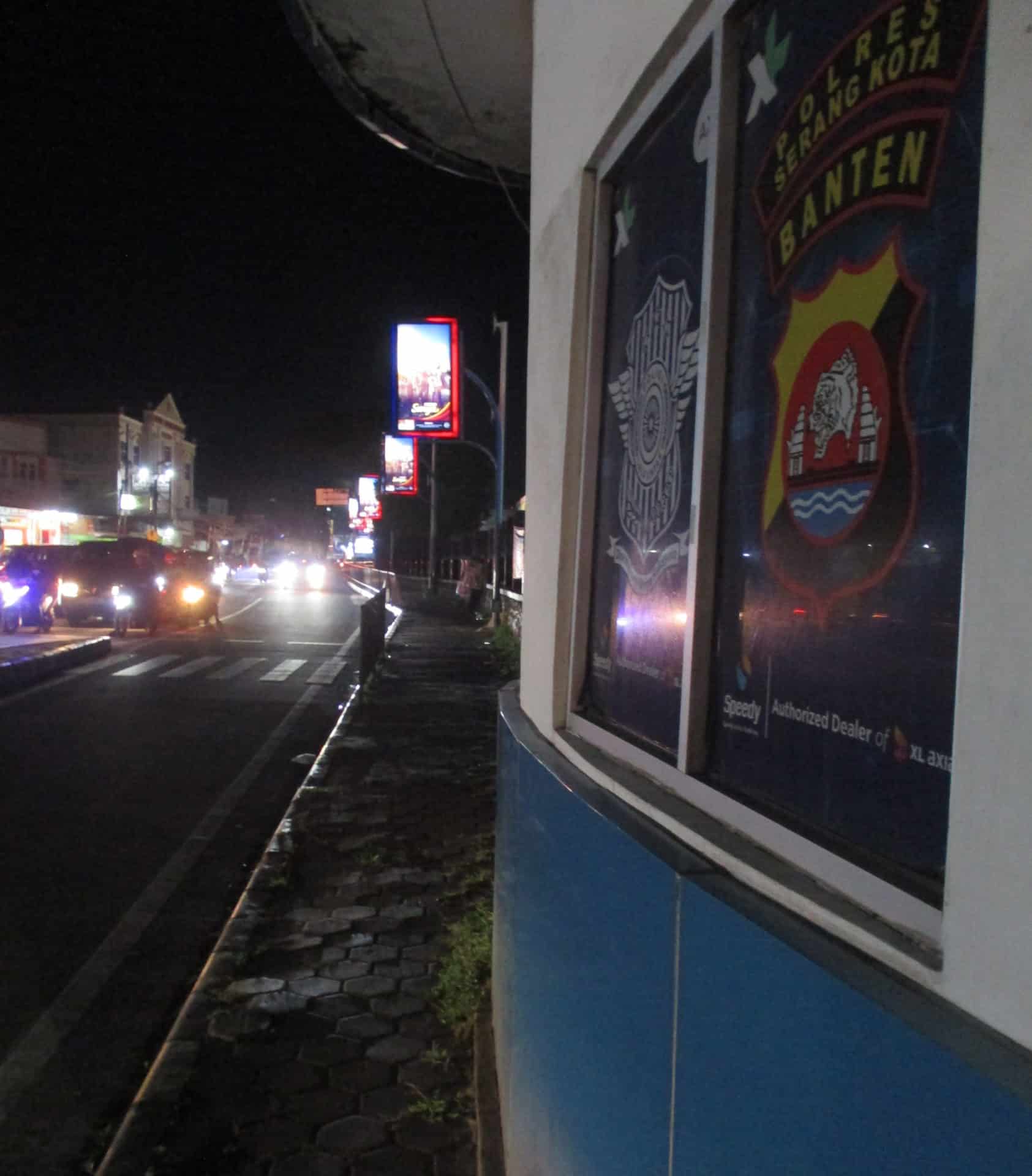
But at night, this police post appears empty. And because of that, opportunities to do criminal acts are thrown wide open: stickups, sexual harassers, even thieves who use hypnosis to subdue their victims. The criminality here, which strikes randomly, has become an open secret. One unsettling thing that happens routinely is motorbike street racing, done by a group of teens at weekends, usually taking place at 1am when the roads are emptying out. Apart from the noise pollution, I often get anxious about the possibility of a fatal accident. If some misfortune causes one of these racers to lose control of their scooter one night and crash it into the bench where I’m sitting – for the love of God, a not even slightly cool way to die.
Recently, a group of youths suspected of being a motorcycle-gang captured a lot of publicity when they blockaded the Ciceri red-light. The whole city knew about it because it went viral on social media. Gathering in the middle of the night, intending to spread terror, they held up sharp weapons like sickles and samurai swords while singing songs with lyrics filled with threats.
Imam is becoming comfortable here at Ciceri, sharing the space with people, mixing, joining in. His ears are starting to get used to the sounds of car exhausts, his nose is being trained to endure unappetizing smells.
One night, after emptying half a packet of cigarettes on a sidewalk bench at Ciceri, I was ready to go home. I looked at my watch and saw it was already 2am. The weather was getting colder. Soon enough the sun would be rising.
Just as I stood up to go home, a dark blue pick-up truck stopped in front of me. Initially I thought they might want to abduct me. In fact, suddenly, and without any instruction, two young children came running up to the truck, then jumped into the back like wolves. I know that these kids usually save the coins they beg in plastic snack packets, and put notes in their pants pockets. The driver of the truck exited the cab, slamming the door as he did so. Without caring at all about my presence, he demanded the children’s money, which he exchanged for two packets of bread.
It all happened very fast. The truck drove off to the west, towards the town square.
Young children exploited and forced into begging by criminals, with their earnings confiscated at the end of each night: I could not fathom that such a thing could be happening immediately in front of a police post. That a police post, instead of bringing order, had instead been turned into a symbol of powerlessness. It was as if those bastards had wanted to send a message: we’re even brave enough to act in the lion’s den.
***
A homeless person approaching me, sad eyes focussed on my cigarette.
‘Might get a match, too, Bang’. He speaks casually, as if we’re old friends who’ve just been reunited.
‘Sure. Let me light it for you’. I flick my lighter, and he moves towards it.
I say, ‘you can sit here if you like, Bang’.
‘Oh, no problem Bang. I’ll stay over there’.
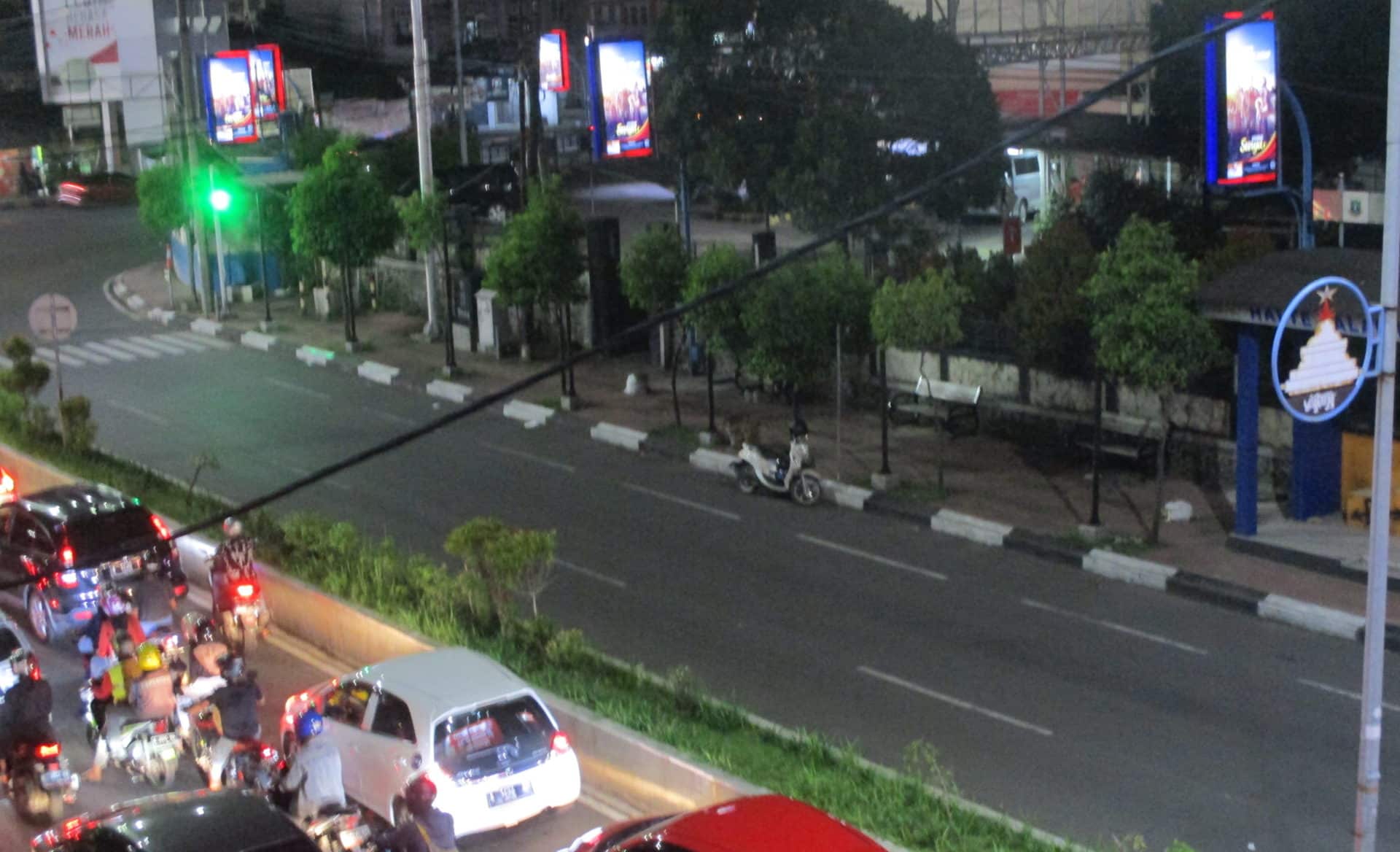
Our interaction passes quickly, yet with an intimacy of sorts. He’d asked to bum a cigarette. Two of them had been taken from my pack, one going straight between his lips, the other placed behind his ear. Now, a moment after that first cigarette’s end being lit, he’s already leaving, turning his back to me, smoke rising in the air.
I don’t know why the homeless are unwilling to sit or curl up to sleep on the sidewalk benches. Even on the quietest nights, they prefer to hide beneath the overhead footbridge or sleep in the corners of the small bus stations. The reason usually given is because the benches make them feel exposed, while the bus stations and under the bridge lets them hide, so they feel safer from the possibility that police and social service workers might pick them up and detain them. Even though the police presence here is largely illusory. Maybe the homeless are also wanting to avoid the cold of night, though bus stations and under bridges don’t bring warmth, either.
We all know the city government and the homeless are not friends. The city government considers the homeless a threat, and the feeling is mutual. Multiple groups targeted by the state – beggers, the homeless, street children – are active at Ciceri sidewalk.
But government raids happen rarely. Even though cameras are everywhere, and that police post is standing right there. Attention is concentrated on two groups, commercial sex workers and those who break the Ramadhan fast. Even if the homeless sleep on these benches, the authorities won’t care. The homeless will be fine as long as they don’t become prostitutes or sell food in the day during Ramadhan. The authorities care more about matters of heaven and hell than about structural poverty.
***
‘So why do you hang out here?’
Imam, an old friend from the kampung, has been brought by work business to Serang. ‘Better in a café, no? At least there you can recharge your phone and get free internet’.
I don’t answer. In my head I find no response good enough to act as a rejoinder to him and his finnicky criticisms. Every time Imam invites me to meet, I propose Ciceri sidewalk. As a guest here, of course, he can only follow the will of the host. So he leaves the place where he stays on a motorbike taxi and follows after me.
My usual ‘starling’ coffee-vendor is now passing by on his no-frills bike. He’s an old man, tall and thin, his clothes too loose for his body.
I order two hot black coffees and two bottles of water. The coffees come served in clear plastic cups, and the sharp aroma seems to make Imam forget his question.
‘To get a martabak telur here’d be good, wouldn’t it?’ Imam’s fingers are on his phone screen, searching a menu in one of the food delivery apps. ‘Calm down: my treat’.
When the traffic-light in front of us turns red, we talk about many things. When it changes to green we go silent straight away, because amid the moving vehicles our voices turn to faint mumbles. The motorbike drivers of Serang, and elsewhere in Indonesia, have a primeval desire to compete to make noise pollution.
A red light also means the beggars and buskers have an opportunity to get some rupiah. A man naked to the chest, his whole body painted silver, silently impersonates a statue at a zebra crossing for a minute, then knocks on windscreens with his hand and makes pleading gestures. Two young girls sing with croaky voices, the playlist all Melayu songs, their instruments only water bottles filled with a little rice, so that they make a sound when shaken.
After half an hour, a motorbike taxi driver in a green uniform parks in front of us. Imam has already given instructions that he’s sitting on the farthest sidewalk bench, closest to the police post, and wearing a blue shirt, but the driver is compelled by procedure to call out Imam’s full name.
Two cardboard containers with martabak telur, a meat and egg-stuffed pancake, are handed over. Then Imam hands one back to the driver.
‘It’s only the two of us, Pak’, he says while scratching his head, signalling his awkwardness. ‘It’s a waste if it’s not eaten. Take one, would you?’
The driver assents enthusiastically. He thanks us, then lifts two hands into the air, saying a prayer for us. Then he moves to another sidewalk bench, four down from our bench, and joins some other motorbike taxi drivers who are sitting there waiting for bookings. From a distance they can be seen diligently dividing the martabak up, maybe taking care to cut it evenly so everyone gets the same share. One of them waves to us and gives a thumbs-up, then the others do the same.
From the look on Imam’s face, I conclude that he is feeling welcomed in this little community here.
I come to realise why Ciceri sidewalk is my favourite place to spend evenings. In this place, everything happens. Ciceri sidewalk, with all its drawbacks and all its disorder, with its pungent aromas and ferocious mosquitoes, is an important place for a lot of people. Motorbike taxi drivers, starling coffee vendors, buskers and the homeless, college students and night-shift workers, pass by or sit here for a little while. With different backgrounds and different styles, it’s like we’re a bunch of strangers gathered randomly on the same ship – and who then sail, facing the ocean waves.
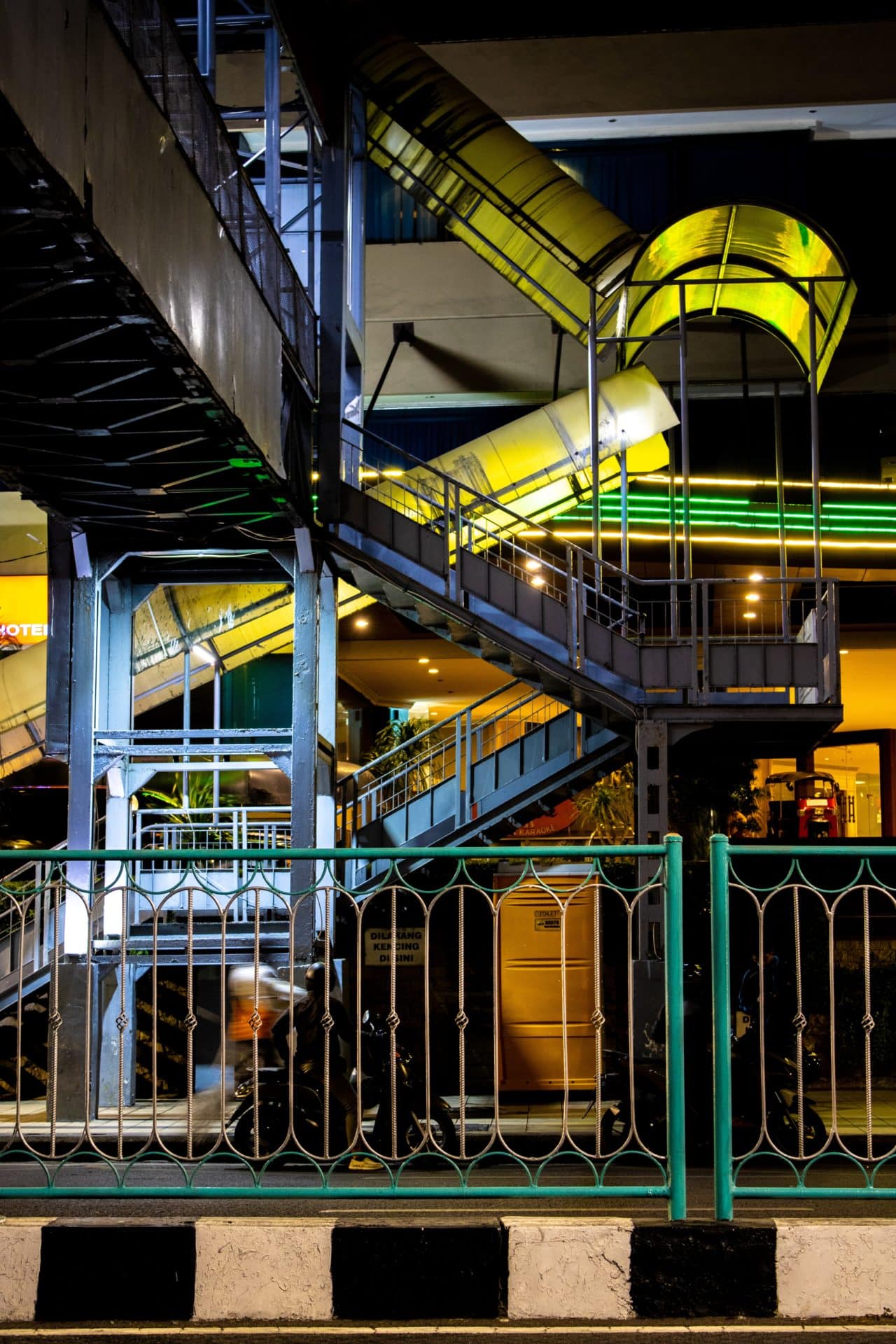
We sit in our own groups or remain alone on these benches that have been provided, as if we’re separated. But actually, we’re connected to each other. We become one. Because any sense of security is illusory, on Ciceri sidewalk, the crowdedness instead brings solidarity.
More than that, by visiting Ciceri sidewalk regularly I’m able to understand better the reality of life for others – something not often discussed in college classes. Because I grew up middle class, hanging out and chatting in a place like this is an opportunity to become more aware and more empathetic.
I want to tell all this to Imam. But he’s enjoying himself chewing a piece of martabak, and appears to not want to be disturbed by anyone just now.
Imam is becoming comfortable here at Ciceri, sharing the space with people, mixing, joining in. His ears are starting to get used to the sounds of car exhausts, his nose is being trained to endure unappetizing smells.
Imam polishes off the last piece of martabak, full of spirit, the stinging smells of Ciceri sidewalk having failed to suppress his hunger.
When a busker with a mullet hairstyle comes up to us, his voice and the sound of the plucked ukulele strings sounding equally discordant, Imam soon reaches into his pockets for change. The busker, filled with confidence, is singing the song ‘Ode Buat Kota’ (Ode to the City), by the group Bangkutaman.
He arrives at these lyrics:
‘For the clamorous sounds on every street
For the sound of feet passing by
For the sound of a siren, king of the street
For the discordant sounds which continue to pound…
I know this is the right choice of song to be played beside this sidewalk bench in Serang. It sounds like a song of hopelessness, yet it carries the spirit of togetherness.
© Muhammad Nanda Fauzan
English translation © Lise Isles


